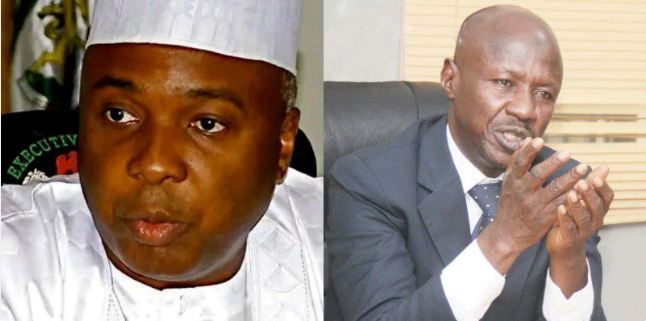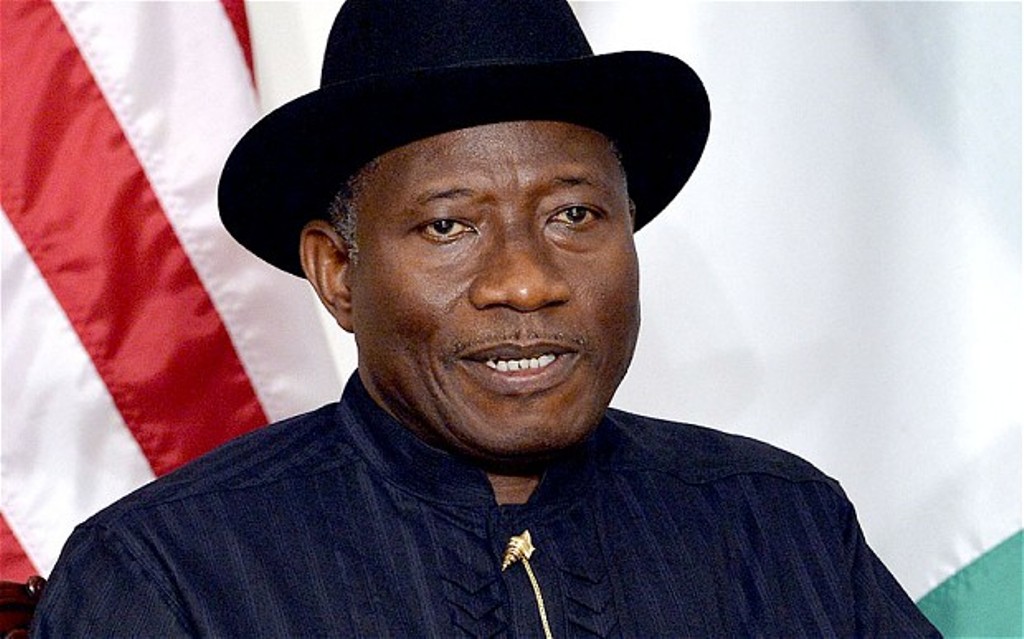The Acting Chairman of the Economic and Financial Crimes Commission (EFCC), Ibrahim Magu, Friday said looters now stash illicit funds in Ghana, Egypt, Cameroon, South Africa, Niger Republic, Morocco and other African countries.
He said the preferred destinations for looters had traditionally been the United Kingdom, United States, Switzerland, Luxembourg, and Seychelles, but they are now expanding fast to African countries.
Magu made the disclosure at the signing of a Memorandum of Understanding (MoU) between EFCC and its Nigerien counterpart, the High Authority Against Corruption and Relating Crimes( HALCIA), in Niamey.
He said: “From available intelligence and our investigations, it has been revealed that looters from Nigeria now go to Ghana, Egypt, Cameroon, South Africa, Equatorial Guinea, Niger Republic, Morocco, Seychelles and so on, to stash their loots.
“This has led to sharp increase in the number of Nigerians buying properties in African countries.
“Nigerians even go to the extent of changing their names and acquiring the destination countries’ international passports in collusion with corrupt public officers in their countries of residence in order to hide their identities and evade detection,” he said, adding that, “the fight of the EFCC against looters’ safe havens is total.”
The EFCC boss further disclosed that his visit to Niger was part of his ongoing tour at mobilising international effortsto deny looters safe haven abroad.
He said: “We have already visited Ghana and Cameroun, today we are in Niger Republic and we will continue to reach out to other preferred looters destinations in Africa and beyond. Interestingly, the efforts of the Nigerian Government to trace, recover and return assets stolen from Nigeria coupled with our increased advocacy to discourage safe havens have begun to yield results.
“It is my conviction that our collaborative efforts will go a long way in eliminating safe havens. In fact, this is in tandem with renewed global commitment by countries to shut their doors to stolen funds.
“I also want to call for conscious measures to sanitize and strengthen the legal framework so as to make it difficult for looters to transfer illicit funds to Niger Republic for investment or whatever purpose.”
Magu called on the global community to redouble its efforts towards strengthening the mechanisms for dismantling safe havens for proceeds of corruption.
He also called on the international community to ensure the return of stolen funds and assets to their countries of origin.
According to a statement by the Acting Head of Media and Publicity of EFCC, Tony Orilade, the MoU will strengthen the collaborative efforts between the EFCC and its Nigerien counterpart.
Section seven of the MoU captures how the parties will exchange information, including those which are necessary to achieve its objectives.
According to the section, “The parties will exchange information in accordance with this Memorandum of Understanding in conformity to the relevant laws of Niger and Nigeria relating to the protection of privacy and confidentiality.”
To help the Commission take its fight against corruption to Nigerians looters who have found safe haven in Niger Republic, Magu made a five-point appeal to the President of Niger Republic, which are as follows:
(i) Identifying huge cash in the financial system owned by Nigerians to enable us find out if they are looted funds/proceeds of crime.
(ii) Identifying the numerous properties owned by Nigerians including the details of the owners in order to enable the Commission ascertain if such Nigerians acquired the properties from looted funds/proceeds of crime
(iii) Stopping moves by persons who plan to move funds at this period through the usual medium to destabilize the political stage in Nigeria.
(iv) Increased clamp down on Nigerians who are involved in cyber-crime and handing over their details to us for further necessary action.
(v) Assisting the EFCC in the arrest of persons on the wanted list of the Commission who absconded to Niger Republic due to the free movement granted to citizens of the ECOWAS states.
The EFCC boss praised President Muhammadu Buhari for his support to the Commission, noting that “Nigeria is ready and willing to partner with international agencies and individual countries on bilateral basis to confront crimes and corruption.”
While meeting with the parliamentarians, at the Assemblee Nationale, Magu told the second Vice President, Mohamadou, that, there was the need to rework existing legislations in Niger to help strengthen anti-corruption fight in the country.
He also noted the need for the country to domesticate the United Nation’s Convention Against Corruption (UNCAC) in order to make its meaning and impact bear on the lives of the country’s citizens.
While decorating the Nigerian Ambassador to Niger Republic, Ambassador Haliru and all the embassy staff with the EFCC lapel, Magu urged them to acknowledge the anti-corruption fight as a collective one.
“Whether you are at home in Nigeria or in the Diaspora, you need to make your contribution. Add your voice to the crusade against corruption. The fight is real. Don’t also forget that corruption is fighting back, but together, we shall win,” he said.
Ambassador Haliru, in turn, praised the EFCC boss for his zeal and passion for the job. “We are hearing and seeing all your achievements in the fight against corruption. We are praying to God Almighty to give you good health and long life to confront the corrupt”.
For the President of HALCIA, Abdourmane Gousmane, there is no better time than now for stronger collaboration between Nigeria and Niger Republic in the fight against corruption.
“We are ready and willing to partner with Nigeria. Nigeria has the experience and the human capacity and with President Muhammadu Buhari, who is a renowned anti-corruption icon, we have no choice than to leverage on Nigeria for capacity building in taming the corruption monster,” Gousmane said.
One of the side attractions of the visit was Gousmane’s presentation of a horse as a special gift to Magu.

